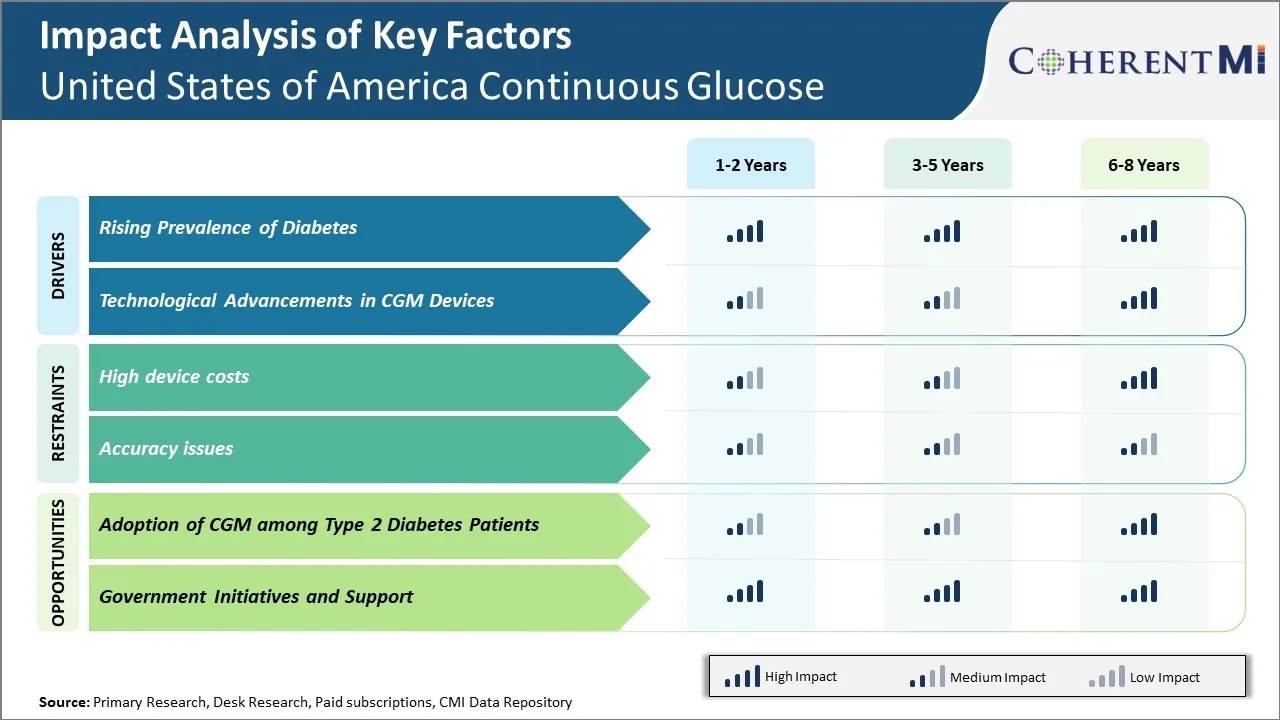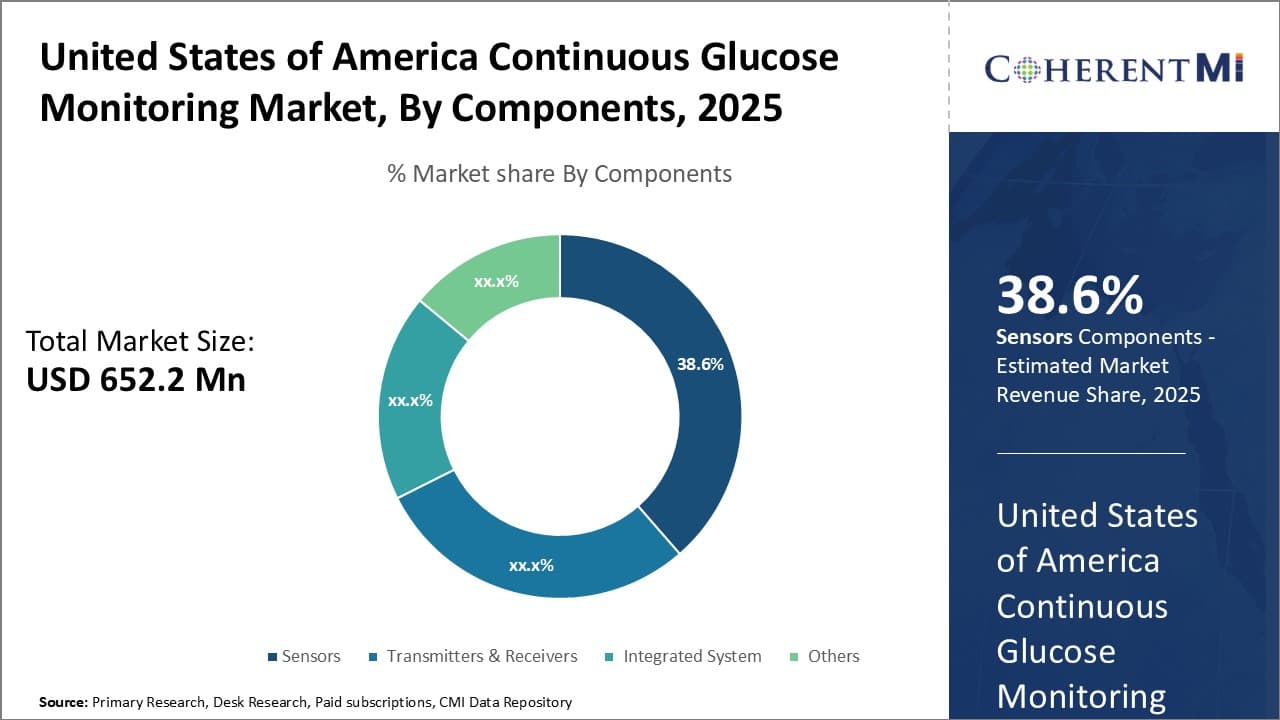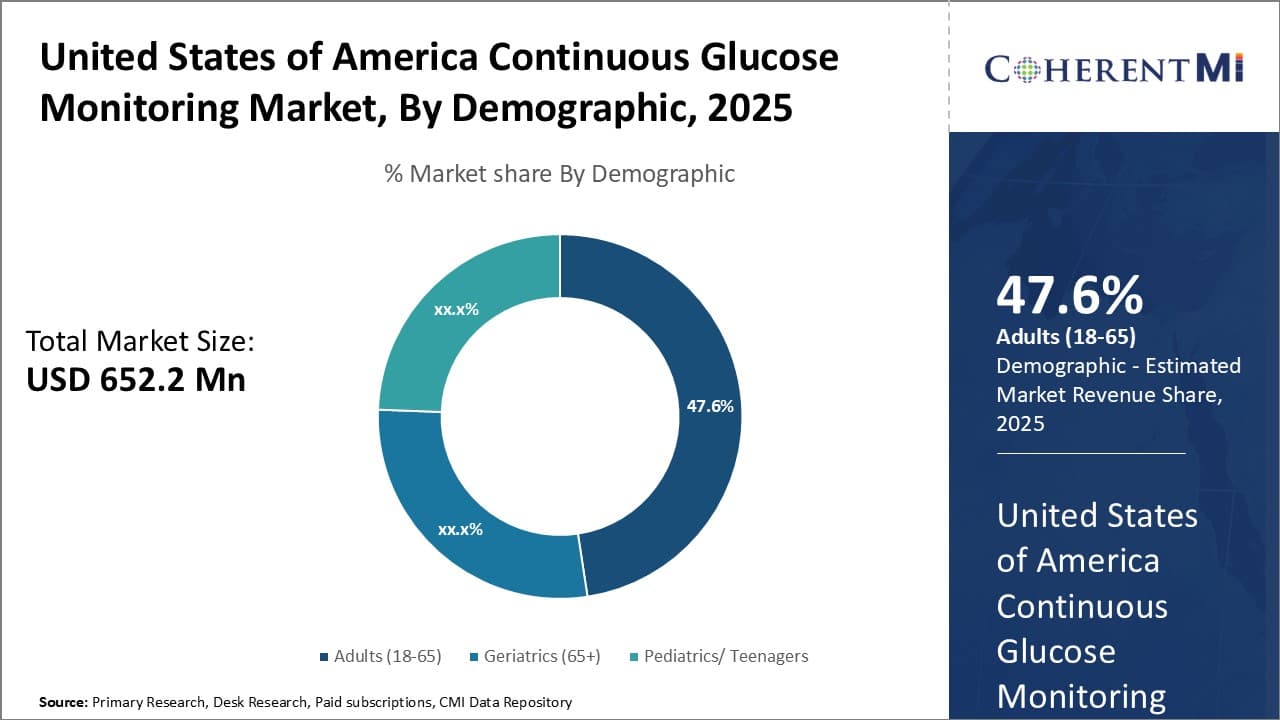United States of America Continuous Glucose Monitoring Market Size - Analysis
The United States of America Continuous Glucose Monitoring Market is estimated to be valued at USD 652.2 Mn in 2025 and is expected to reach USD 1177.0 Mn by 2032, growing at a compound annual growth rate (CAGR) of 8.8% from 2025 to 2032.
The continuous glucose monitoring market in the United States is expected to witness significant growth over the forecast period, owing to the increasing prevalence of diabetes in the country.
Market Size in USD Mn
CAGR8.8%
| Study Period | 2025-2032 |
| Base Year of Estimation | 2024 |
| CAGR | 8.8% |
| Market Concentration | Medium |
| Major Players | Abbott, Dexcom, Inc., Medtronic, Senseonics, Inc., F. Hoffmann-La Roche Ltd. and Among Others |
please let us know !
United States of America Continuous Glucose Monitoring Market Trends
Market Driver – Rising Prevalence of Diabetes
The rising prevalence of diabetes has become a major public health challenge in the United States and is one of the key factors contributing to the growth of the Continuous Glucose Monitoring (CGM) market. As per the latest data from Centers for Disease Control and Prevention (CDC), around 37.3 million Americans suffer from diabetes, which is approximately 11.3% of the total US population. Alarmingly, diabetes also remains underdiagnosed, with almost one in four cases going undetected. This growing burden of diabetes indicates a dire need for advanced glucose monitoring solutions to help manage the condition in a better way.
Continuous glucose monitoring aids in maintaining near-normal blood glucose levels among people with diabetes. Unlike fingerstick tests which only provide snapshots at single points in time, CGM systems monitor glucose readings in real-time and display trends to help patients make better treatment decisions. This empowers individuals to preemptively adjust insulin doses or carbohydrate intake based on predicted highs and lows. CGM has been proven to lower A1c levels and lower the risk of hypoglycemia, leading to improved clinical outcomes over time. Awareness regarding such benefits of CGM is increasing among patients as well as healthcare providers in the US.
Market Driver – Technological Advancements in CGM Devices
Technological advancements in continuous glucose monitoring (CGM) devices are significantly fueling the growth of the United States CGM market. The advanced CGM systems available nowadays provide ample benefits over traditional fingerstick monitoring to diabetes patients. The real-time glucose readings from these devices enable improved diabetes management and help patients better control their blood sugar levels.
Some of the latest CGM technologies integrate cutting-edge features like advanced alerts and alarms for hypo/hyperglycemic excursions. This facilitates timely intervention and reduces the risk of potentially life-threatening glucose fluctuations. The availability of smartphone-compatible CGM devices has further enhanced convenience. Patients can easily view glucose data and trends on their phones throughout the day. This type of user-friendly connectivity promotes increased device usage and adherence to therapy.
According to the Centers for Disease Control and Prevention (CDC), nearly 14% of the U.S. population has been diagnosed with diabetes as of 2018. The growing prevalence of this chronic condition combined with advances in CGM functionality and accessibility are fueling heightened demand. This rapid development and adoption of innovative CGM tools is projected to drive continued expansion of the U.S. market in the coming years.
 To learn more about this report, Download Free Sample Copy
To learn more about this report, Download Free Sample Copy
Market Challenge – High Device Costs
The high device costs have been a major restraining factor for the growth of continuous glucose monitoring market in United States. The continuous glucose monitoring (CGM) devices require regular calibration with finger-prick blood glucose readings and consumption of disposable sensors every 7-10 days. This makes CGM a recurring expense for diabetes patients. The average CGM device costs around $1500-$2000 upfront without including the additional costs of sensors and calibration supplies. Most healthcare insurance plans have poor coverage for CGM supplies and sensors which need to be replaced frequently.
Many diabetes patients refrain from adopting CGM due to the high recurring costs involved. The annual costs of CGM can range from as high as $3000 to $5000 for a patient depending on the device, number of sensors used and insurance coverage. As per a study published in CDC (Centers for Disease Control and Prevention) in 2022, over 37% of American diabetes patients who could benefit from CGM have reported cost as the main factor for not being able to access this advanced technology.
Market Opportunity – Adoption of CGM Among Type 2 Diabetes Patients
The adoption of continuous glucose monitoring (CGM) among type 2 diabetes patients in the USA presents a major growth opportunity. Type 2 diabetes accounts for 90-95% of all diagnosed adult cases of diabetes in the country. As per the Centers for Disease Control and Prevention (CDC), over 37 million Americans were estimated to have diabetes as of 2021, with the number expected to rise significantly in the coming years due to aging population and increasing prevalence of obesity and sedentary lifestyles. CGM provides real-time glucose readings throughout the day and night, allowing better management of blood sugar levels for patients.
Wider adoption of CGM among type 2 patients can help tackle the rising healthcare costs associated with diabetes management in the USA. Left uncontrolled, high blood sugar can cause severe health issues requiring extensive medical treatment. Data from the American Diabetes Association shows diabetes-related direct medical costs were estimated at $327 billion in 2017, with type 2 accounting for the majority. CGM assists patients and physicians in making timely therapy adjustments, preventing hyper/hypoglycemic events and associated physical/financial burden in the long run.
Segmental Analysis of United States of America Continuous Glucose Monitoring Market
 To learn more about this report, Download Free Sample Copy
Insights, By Component: Sensors Drive Component Segment Growth
To learn more about this report, Download Free Sample Copy
Insights, By Component: Sensors Drive Component Segment Growth
In terms of components, sensors contribute the highest share of 38.6% owing to continuous technological advancements and their critical role in glucose monitoring. Sensors play a vital part in continuously collecting and transmitting glucose level data from the interstitial fluid or blood to receivers for analysis and trends.
The non-invasive nature and accuracy of modern sensors is a major factor boosting their adoption rate. Patients find sensors more convenient than conventional finger-prick methods, improving compliance with treatment regimens. Sensor miniaturization allowing for convenient accessories like inserters has expanded the target demographic beyond adult users.
Furthermore, sensors are a consumable component requiring regular replacement, generating a steady recurring revenue stream for manufacturers. This dependable aftermarket demand is a key driver of the sensor segment's market dominance. Continuous research into painless, enhanced accuracy and reliability is widening sensors' performance edge over other components. Their ability to facilitate comprehensive diabetes management without disturbance to lifestyles cements sensors' importance to users and the overall industry.
 To learn more about this report, Download Free Sample Copy
To learn more about this report, Download Free Sample Copy
Insights, By Demographic: Adults Lead Demographic Segment Due to Established Routines
Among demographics, adults between 18-65 years contribute the highest share of 47.6% due to established daily routines and working schedules favoring consistent glucose monitoring. Management of diabetes is especially critical for adults during working years to prevent occupational impediments from complications. Regular nine-to-five schedules and meal timings facilitate adherence to monitor readings several times daily as prescribed. Employed adults also have stronger financial capabilities to afford continuous glucose monitoring devices from out-of-pocket or insurance compared to other groups.
Furthermore, experiencing diabetes through developing adult years fuels understanding within this demographic of glucose's influence on health and quality of life into later stages of life. Adults additionally transmit responsible self-management behavior to caregivers for children or geriatric family members with the condition.
Therefore, continuous monitoring provides highly-motivated adult patients the detailed health data needed to properly oversee diabetes long-term.
Competitive overview of United States of America Continuous Glucose Monitoring Market
The major players operating in the United States of America Continuous Glucose Monitoring Market include Abbott, Dexcom, Inc., Medtronic, Senseonics, Inc., F. Hoffmann-La Roche Ltd., GLUCOVATION, INC., Nemaura Medical Inc., GlySens, GlucoModicum, and Signos, Inc.
United States of America Continuous Glucose Monitoring Market Leaders
- Abbott
- Dexcom, Inc.
- Medtronic
- Senseonics, Inc.
- F. Hoffmann-La Roche Ltd.
Recent Developments in United States of America Continuous Glucose Monitoring Market
- In February 2022, Senseonics Holdings, Inc., a medical technology company focused on the development and manufacturing of long-term, implantable continuous glucose monitoring (CGM) systems for people with diabetes, announced the approval of the next-generation Eversense E3 CGM System by the US Food and Drug Administration (FDA).
United States of America Continuous Glucose Monitoring Market Segmentation
- By Components
- Sensors
- Transmitters & Receivers
- Integrated System
- Others
- By Demographic
- Adults (18-65)
- Geriatrics (65+)
- Pediatrics/ Teenagers
- By Indication
- Type 1 Diabetes
- Gestational Diabetes
- Type 2 Diabetes
- Others
- By End-User
- Hospitals
- Home Care
- Clinics
- Nursing Homes
- Others
Would you like to explore the option of buying individual sections of this report?
Manisha Vibhute is a consultant with over 5 years of experience in market research and consulting. With a strong understanding of market dynamics, Manisha assists clients in developing effective market access strategies. She helps medical device companies navigate pricing, reimbursement, and regulatory pathways to ensure successful product launches.
